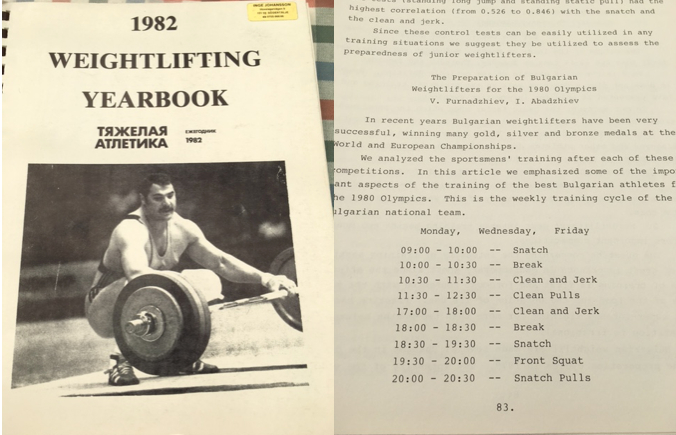It is nearly impossible to determine when the world's first weightlifting competition took place. Drawings or writings about strength competitions in which the athletes lifted heavy weights can be found as far back as ancient Greece, Egypt and China. Weightlifting as we know it developed as a sport during the nineteenth century. In 1891 the German Athletes Association (DAV) was founded and on March 28, 1891 the first world championships in weightlifting took place in London. A total of seven weightlifters from a total of six nations took part in the competitions organized by the International Weightlifting Federation (IWF). There were no weight classes, whoever could lift the most weight won. The technique didn't matter, the only rule was that the feet were not allowed to move. Briton Edward Lawrence Levy won the title of "Amateur Champion Weightlifter of the World".
In 1896, men's weightlifting became Olympic and was one of nine sports represented at the first modern Olympic Games in Athens. In two competitions, one-armed and two-armed lifts were performed without body weight restrictions. Later there were a whole series of variations. While rigid dumbbells were initially used, there was a development with the invention of the disc dumbbell in 1910 by the German Karl Berg. In this way, weights in the form of discs could be variably attached to a rod.
Men's weightlifting has always been part of the Olympic Games, with three exceptions in 1900, 1908 and 1912. Women's weightlifting championships have been held since the 1980s, and women's weightlifting has only been Olympic since the year 2000 and the Olympic Games in Sydney.
More order came to weightlifting from the 1920s, when five weight classes were introduced (feather, light, intermediate, light-heavy, and heavy) and a triathlon was contested. For this, the achievements from one-armed snatch and clean and jerk and two-armed clean and jerk were added together. In Paris 1924, a pentathlon was held in these five weight classes, for which the achievements from both arm presses (like a clean and jerk, but legs and feet may not be moved), snatches and clean and jerks and from one-arm snatches and clean and jerks were added up. From Amsterdam 1928, athletes continued to compete in five weight classes, but now in the Olympic triathlon that had been common for many years. This consisted of two-armed presses, yanks and jabs. When snatching, the weight is brought with a wide grip directly over the athlete's head in the so-called high stretch ( snatch). When you jerk, the weight is "repositioned" with a tighter grip, i.e. placed on the front shoulders and then "expelled" into the high distance ( Clean and Jerk ). The press, the correct course of which could only be judged with difficulty, since some athletes used their legs to support the press movement and leaned very far back, and which was therefore also controversial in sports medicine, was eliminated in 1972. The official justification given by the International Weightlifting Federation for dropping the press was that performance development had blurred the lines between the press and the clean and jerk. From this point until today, the results of the snatch and clean and jerk are added together and the person with the highest total weight in the respective weight class wins.
In the meantime, there were up to ten weight classes at the Olympic Games: bantamweight was added in 1948, followed by medium heavyweight in 1952, second heavyweight and super heavyweight in 1972 and finally first heavyweight in 1980. Since 1998, the men's competitions have been held in eight weight classes (flyweight and second heavyweight have been eliminated) and since January 1st, 2017 the women's competitions have also been held in eight (previously seven) weight classes.
The most successful nations are Russia/USSR and especially in modern times China. In the women's competition, the Chinese have dominated from the start.
Pioneers of the sport include Pyrros Dimas, an Albanian who emigrated to Greece in 1991. Dimas is a seven-time world and three-time European champion and has won a total of three gold medals at the Olympic Games. By winning his fourth Olympic medal (bronze, 2004 in Athens), he is the most successful weightlifter to date (3x gold, 1x bronze) and together with the German Ronny Weller (1x gold, 2x silver, 1x bronze) the American Norbert Schemansky (1x gold, 1x silver, 2x bronze) and Bulgarian Nikolaj Pešalov, who later competed for Croatia (1x gold, 1x silver, 2x bronze) winner of most Olympic medals in weightlifting. Both Ronny Weller and Ingo Steinhöfel (silver, 1988 in Seoul) represented Germany five times at the Olympic Games. Hungarian weightlifter Imre Földi also competed in five Olympic Games.
In women's weightlifting, the Chinese Yanqing Chen and Chunhong Liu have been the most successful with 2 gold medals each.
The Russian Vasily Ivanovich Alexeyev was one of the few weightlifters who gained worldwide fame through their sport. He won the Olympic super heavyweight gold medal in 1972 and 1976 and won numerous titles at world and European championships. Alexeyev set 80 world records during this time, which is unmatched to this day. Alexeyev's trainer was Rudolf Pflugfelder, who now lives near Kassel in Germany, and whom I visited a few years ago. Which was one of the most interesting conversations I've ever had about training. Rudolf Pflugfelder won the Olympic gold medal himself before becoming the Russian national coach.
The Turk Naim Süleymanoglu, who was born in Bulgaria with the name Naim Süleimanov and set his first world record at the age of only 14, was also extremely successful. He fled from Bulgaria to Turkey and now called himself Süleymanoglu. Due to his strength and small size, he is nicknamed "Pocket Hercules", by which he is known in the weightlifting scene. Suleymanoglu managed to lift three times his own body weight as the second lifter after Bulgaria's Stefan Topurow. He was a three-time Olympic featherweight champion between 1988 and 1996.
The naturalized Austrian Matthias Steiner was the last German to win gold in the super heavyweight division in Beijing in 2008, making him the first German Olympic champion in weightlifting since Ronny Weller in 1992.
Weightlifting exercises have very positive effects on explosive power and muscular balance and are therefore adopted by numerous sports worldwide as part of their training. More articles in this series about weightlifting will follow in the coming weeks.
If weightlifting has piqued your interest, attend the YPSI Weightlifting Workshop and learn the weightlifting snatch and clean & jerk and their related exercises in a step-by-step approach. More details and registration here

